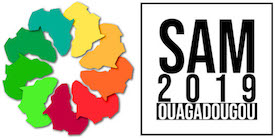“We  need to develop services with added value to increase impact,” said Corinne Molitor of ADA during the first Wednesday plenary session at SAM. In the absence of non-financial services, financial inclusion does not lead directly to reduced poverty. To find evidence of poverty alleviation, she says, we must consider the long term because reducing poverty is a very slow process. Mathieu Ciowela of the UN Development Program said of the Sustainable Development Goals (SDGs) that, “We have been implementing this for four years. Maybe in 10 years we’ll have data on progress.”
need to develop services with added value to increase impact,” said Corinne Molitor of ADA during the first Wednesday plenary session at SAM. In the absence of non-financial services, financial inclusion does not lead directly to reduced poverty. To find evidence of poverty alleviation, she says, we must consider the long term because reducing poverty is a very slow process. Mathieu Ciowela of the UN Development Program said of the Sustainable Development Goals (SDGs) that, “We have been implementing this for four years. Maybe in 10 years we’ll have data on progress.”
Adrian Kamenitzer of the European Investment Bank also spoke in terms of decades rather than years. He told a personal story of growing up in Romania and observing the transition from communism. “In 1990, we had a new regime. We had hopes, but we had no private sector, no investors…. Many MFIs were started in the western part of the country. Thirty years later, that is the most economically developed part of Romania.”
Progress is slow because “development challenges are quite complex,” as Mr Ciowela explained, due to the interplay of “poverty, exclusion, inequality, climate change, poor governance and lack of peace.” In working toward the SDGs, he says, we should consider “the 5 Ps: population, prosperity, planet, peace and partnership,” including partnerships across sectors as well as between countries. By “ensuring that people are supported with easy access to finance, training and technology, then jobs will be created. This increases the distribution of wealth,” allowing for improved health, protection of the environment, strengthened peace and a host of other positive outcomes. “Poverty is an open door to crises…. Without peace, nothing can be maintained,” Mr Ciowela said.
Emmanuel Diarra of the African Development Bank (AfDB) discussed “the importance of agriculture, the digital economy, fintech, SMEs, youth and gender equality.” While the number of Africans lacking financial accounts is nearly twice the global average, Mr Diarra sees many reasons for optimism. He says that with “the advent of the fourth industrial revolution – technology – Africa has a number of advantages” such as its young population and their access to mobile phones. He cited the Africa Digital Financial Inclusion Facility, which “is meant to address systemic challenges by making strategic and catalytic investments” during the course of a decade, totaling USD 400 million in value.
Given the magnitude of the challenges before us, Ms Molitor expressed the importance of starting small. Regarding metrics, for example, she said it is better to look at a few important criteria “rather than to chew everything at the same time, which may not be attainable.”
On a related note, Jean-Luc Konan, the Cofounder of Senegal’s COFINA, shared the “legend of the hummingbird” during the second plenary of the day. This story is about doing one’s part to address a challenge that no single person could solve alone. Mr Konan also shared the idea that one should “start by doing what is necessary, then do the desirable, and soon you will find you are doing the impossible.”
By way of example, Mr Konan described the experience of a “woman in Burkina Faso who got a loan from an institution to start a warehouse. This let her enroll her daughter in one of the best universities, [and] she was able to open a mango-processing plant.”
Mr Konan closed with the suggestion that – because 32,000 people are getting to working in age in Africa daily, and only 8,000 are getting formal jobs – we all need to ask ourselves, “How can we play our part like a small hummingbird?”
This article is part of a sponsored series on SAM (the French acronym for African Microfinance Week), a major conference dedicated to financial inclusion in Africa. The most recent SAM took place in Ouagadougou, Burkina Faso, from October 21-25, 2019.
ADA, an NGO based in Luxembourg, co-organizes SAM every two years with the support of Luxembourg’s Ministry for Development Cooperation and Humanitarian Affairs. The SAM steering committee members are: ADA, Luxembourg’s Ministry of Foreign and European Affairs, the Microfinance African Institutions Network, the African Rural and Agricultural Credit Association, and the Fédération des Association Professionnelle des Systèmes Financiers Décentralisés de l’Union Economique et Monétaire Ouest Africaine. We invite you to learn more about SAM at http://www.sam.africa.
MicroCapital has been contracted to promote and document each SAM since 2015.
Additional Resources
Other MicroCapital coverage of SAM and vignettes demonstrating its value to participants
http://www.microcapital.org/category/semaine-africaine-de-la-microfinance-sam/
Vignettes demonstrating the value of SAM en francais
https://www.ada-microfinance.org/fr/evenements/semaine-africaine-microfinance/objectif-sam-2019/paroles-de-nos-participants
Similar Posts:
- SPECIAL REPORT: Yikri of Burkina Faso Wins $110k European Microfinance Award for Progress Toward Food Security #EMW2023
- MICROFINANCE EVENT: Africa Fintech Summit (AFTS); November 2-3, 2023; Lusaka, Zambia
- SPECIAL REPORT: Save the Date for SAM 2023 – African Microfinance Week – in Togo, October 16-20!
- MICROFINANCE EVENT: SAM (Semaine Africaine de la Microfinance); October 16-20, 2023; Lomé, Togo
- SPECIAL REPORT: Fortune Credit of Kenya, Fundación Génesis Empresarial of Guatemala, Yikri of Burkina Faso Are Finalists for European Microfinance Award 2023 on Inclusive Finance for Food Security & Nutrition
